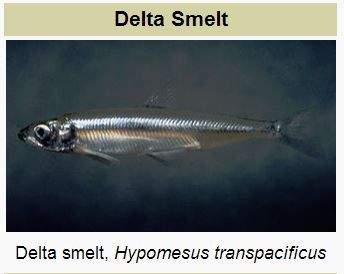Smelt suit threatens water markets

 On June 11, 2014, a coalition of sports fishermen and Northern California groundwater users filed a lawsuit to stop a water transfer from Shasta Lake to California’s parched Central Valley. The basis of the suit is to protect the Delta smelt fish, which is 200 miles away from Shasta Lake. The water transfer in dispute is a willing buyer-willing seller sale of water between Northern California and Central Valley water agencies.
On June 11, 2014, a coalition of sports fishermen and Northern California groundwater users filed a lawsuit to stop a water transfer from Shasta Lake to California’s parched Central Valley. The basis of the suit is to protect the Delta smelt fish, which is 200 miles away from Shasta Lake. The water transfer in dispute is a willing buyer-willing seller sale of water between Northern California and Central Valley water agencies.
The California Sports Fishing Protection Alliance and AquAlliance, a northern California groundwater users’ association, sued to block the U.S. Bureau of Reclamation from transferring 175,226-feet of water from the Yuba County Water Authority to the San Luis and Delta Mendota Water Authority.
Back in August 2013, the SLDMWA unsuccessfully sued the BOR to try to stop a release of 100,000-acre feet of water from Trinity Reservoir for fish runs that otherwise might have flowed to the Central Valley before the current water shortage.
The current lawsuit stops the U.S. Bureau of Reclamation’s planned transfer of 175,226 acre-feet of water from the Shasta Reservoir to the San Luis and Delta Mendota Water Authority, in the epicenter of the current historic water shortage. Shasta Reservoir is the third-largest body of water in California, behind Lake Tahoe and the Salton Sea. It is a federal reservoir that is a part of the Central Valley Project.
Groundwater substitution transfers
At issue are “groundwater substitution transfers,” whereby surface water is transferred from Northern California to the Central Valley and thus has to be substituted with groundwater resources by Northern Californians. A groundwater substitution transfer is not a water grab; it is a willing buyer-willing seller transaction. The SLDMWA has completed 10 water transfers this year, comprising 60,000 acre-feet of water, from willing sellers in the Sacramento River Valley to make up for the zero water allocation from the BOR this year.
The reported going price for water transfers this year is $475 per acre-foot, over 31 times the fixed fee of $15 per acre-foot in typical years. The Yuba County Water Agency has derived a $28 million windfall thus far this year in water sales.
The proceeds from the sales are used by YCWA to lower the costs to Northern California groundwater users for maintaining the extensive system of 100 groundwater-monitoring wells. There are 200 groundwater substitution wells in the YCWA service area. The YCWA assures that such water transfers do not deplete the groundwater in the Sacramento River Valley.
The BOR routinely has filed a negative declaration as to any environmental impacts from conveying water through the Sacramento Delta to agricultural water districts in the San Joaquin and Santa Clara Valleys south of the Delta.
So why have the sports fisherman and Northern groundwater users filed suit to block such lucrative, and needed, water transfers during a compound historic drought and water shortage?
Smelt
Their lawsuit alleges devastating impacts on the Delta smelt fish habitat. Purportedly, the extra pumping to convey the water southward from the Delta will result in higher salinity levels in the Delta that will adversely affect smelt. The plaintiffs contend the smelt will be forced into warmer waters “that are lethal” to the smelt.
During the drought, the State Water Resources Control Board has relaxed the standards for salinity and Delta outflow.
AquAlliance is a 320-member association of Northern California groundwater users. The CSPA is a 2,000 member statewide association dedicated to protecting water for sports fishing and environmental preservation. The complaint states the plaintiffs tried to persuade the BOR that its “environmental review did not comply with the requirements of NEPA” (National Environmental Protection Act) (page 8, lawsuit).
They further contend that “almond trees nor any other crops suffering from the drought are threatened with immediate extinction from the drought” (page 23). While Central Valley citrus and almond trees and row crops certainly won’t be driven into extinction by the drought, it is not certain the smelt will either.
But what may end up extinct are free-market transactions of water that are crucial to flexibly managing California’s water system during droughts.
Related Articles
More Democracy At Election Time
FEB. 2, 2011 by JOHN SEILER “All the ills of democracy can be cured by more democracy,” said Al Smith,
Pensions initiative pulled
The landmark effort to take public pension reform straight to the people of California has been withdrawn from ballot consideration.
Pasadena seeks sanctuary
JULY 23, 2010 By WAYNE LUSVARDI Judicial Watch, a non-profit public interest legal foundation, filed a complaint July 10 in Los Angeles



